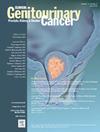卡巴他赛在阉割耐药和骨转移前列腺癌患者中的作用。希腊合作肿瘤学小组的一项 II 期研究:卡巴他赛在有骨转移的 mCRPC 患者中的作用。
IF 2.3
3区 医学
Q3 ONCOLOGY
引用次数: 0
摘要
背景:卡巴他赛是一种有效的治疗方法,适用于既往接受过多西他赛和新型激素治疗的转移性抗性前列腺癌(mCRPC)患者。了解mCRPC疾病的分子生物学并考虑到已批准的几种治疗方案,需要生物标志物来指导决策,包括卡巴他赛治疗:Cababone是一项II期转化研究,旨在确定卡巴他赛疗效的预测因素。有记录显示骨转移的mCRPC被纳入前瞻性研究,并接受卡巴他赛25mg/m2治疗,每3周一次。为转化研究收集了前列腺癌活检组织、骨髓抽吸物和血液样本:60名患者入组,59名患者按照方案接受了治疗。6个月无进展生存率(PFS)为47%(95% CI:33% - 59%),12个月总生存率(OS)为70%(95% CI:56% - 80%)。卡巴他赛治疗可改善反应性造血患者的 PFS 和 OS。有7名患者检测到HRR基因突变:结论:卡巴齐他赛的疗效未因HRR基因突变状态的不同而有所差异。未发现新的安全性问题。总之,卡巴骨证实了卡巴他赛对mCRPC患者(包括HRR基因突变亚组患者)的疗效。骨髓活检中的反应性造血与生存率的提高有关,因此有必要进一步研究骨生物标志物作为卡巴他赛疗效的预测指标。本文章由计算机程序翻译,如有差异,请以英文原文为准。
The role of Cabazitaxel in Patients With Castration-Resistant and Osseous Metastases Prostate Cancer. A Hellenic Cooperative Oncology Group Phase II Study
Background
Cabazitaxel is an effective treatment in metastatic castration-resistant prostate cancer (mCRPC) patients previously exposed to docetaxel and novel hormonal treatments. Understanding the molecular biology of mCRPC disease and taking into account the several approved treatment options, biomarkers are needed to guide decision making including cabazitaxel treatment.
Methods
Cababone was a phase II translational study that attempted to identify predictors of cabazitaxel efficacy. mCRPC with documented bone metastases were enrolled prospectively and treated with cabazitaxel 25mg/m2 every 3 weeks. Prostate cancer biopsies, bone marrow aspirates and blood samples were collected for translational research.
Results
Sixty patients were enrolled and 59 received treatment according to protocol. Six-month progression free survival (PFS) rate was 47% (95% CI: 33% - 59%) and 12-month Overall Survival (OS) rate was 70% (95% CI: 56% - 80%). Patients with reactive hematopoiesis had improved PFS and OS with cabazitaxel treatment. Mutations in HRR genes were detected in 7 patients.
Conclusions
No differences in cabazitaxel efficacy were noted according to mutational status of HRR genes analyzed. No new safety issues were detected. In conclusion, CabaBone confirmed efficacy of cabazitaxel in mCRPC patients including the subgroup of patients with HRR mutations. Reactive hematopoiesis in bone marrow biopsies was related to improved survival warranting further investigation of bone biomarkers as predictors of cabazitaxel efficacy.
求助全文
通过发布文献求助,成功后即可免费获取论文全文。
去求助
来源期刊

Clinical genitourinary cancer
医学-泌尿学与肾脏学
CiteScore
5.20
自引率
6.20%
发文量
201
审稿时长
54 days
期刊介绍:
Clinical Genitourinary Cancer is a peer-reviewed journal that publishes original articles describing various aspects of clinical and translational research in genitourinary cancers. Clinical Genitourinary Cancer is devoted to articles on detection, diagnosis, prevention, and treatment of genitourinary cancers. The main emphasis is on recent scientific developments in all areas related to genitourinary malignancies. Specific areas of interest include clinical research and mechanistic approaches; drug sensitivity and resistance; gene and antisense therapy; pathology, markers, and prognostic indicators; chemoprevention strategies; multimodality therapy; and integration of various approaches.
 求助内容:
求助内容: 应助结果提醒方式:
应助结果提醒方式:


